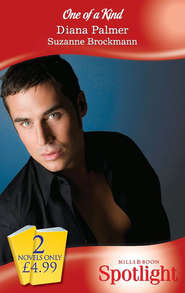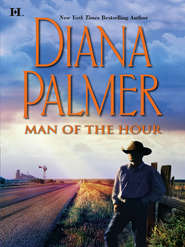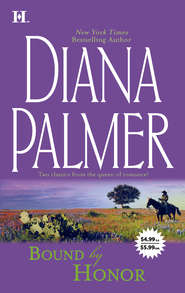По всем вопросам обращайтесь на: info@litportal.ru
(©) 2003-2024.
✖
Noelle
Автор
Год написания книги
2018
Настройки чтения
Размер шрифта
Высота строк
Поля
“Someone tried to beat you up?” she asked, wide-eyed.
He almost told her. Surprisingly, he wanted to. But he shrugged. “Something like that,” he said, and passed it off.
“You don’t like being wrong, do you?” she asked him.
He laughed, annoyed. “I rarely am.”
“How conceited,” she shot back, but she smiled.
“I know the law.” He corrected her faulty impression. “I’ve been in practice for ten years.”
“That’s what Andrew said.”
He wondered what else his stepbrother had told her about him. Nothing good, he was certain. Andrew didn’t like him, and the younger man was apparently taken with Noelle. He wouldn’t like an older rival.
“Andrew and I are very different,” he pointed out.
“Yes, I know. He’s much younger than you, isn’t he?”
His jaw tautened. “Not that much younger,” he said irritably.
“It’s very odd, you know,” she said thoughtfully, studying him, “that you look so much older than he does. Shouldn’t it be the opposite? I mean, he was in the war and you’ve spent years sitting in a courtroom. One would think that a soldier, a man who dealt in death, would look older than a well-dressed lawyer who never had to face more than an occasional verbal threat.”
His eyes dropped to her long-fingered, elegant hands folded on the desk. She had no idea what his life had been like. She was right, but she didn’t know the truth. He’d lived more in his lifetime than Andrew ever would.
“I haven’t offended you, have I?” she asked worriedly. “I sometimes speak without thinking.”
His eyes shot back up to catch hers. He smiled slowly. “You’re not afraid of me. I’m glad. I don’t pull my punches, and I won’t expect you to. Our association should prove to be an interesting one, with a basis of such honesty.” He eased off the edge of the desk and got to his feet. He leaned heavily on the cane, wincing.
“It’s an old injury, isn’t it?” she asked, standing up, and continued before he could reply. “You must have had a hard time getting around in a big city like New York. It’s less crowded here.”
She’d gone to open the door for him, and he gave her a glare that disconcerted her with its cold fury.
He reached over, grasped the door’s edge, and slammed it. The noise made her jump. His expression was even more threatening than the loud noise.
“I don’t need doors opened for me, a rocking chair to rest in, warm milk to help me sleep, or solicitous exaggerations from a woman who sees me as a cripple!”
She gaped at him. “I thought no such thing about you! I would have opened the door for anyone who—who…” She flushed.
“Anyone who was crippled, isn’t that what you meant to say? Spit it out, then.”
“All right,” she said furiously. “I’d open a door for anyone who was crippled. There! Does it make you happy to have embarrassed me so? Would you rather I pretended that there’s nothing wrong with you, when I can plainly see that it hurts you just to stand up?”
He drew in a sharp, angry breath. He leaned ever more heavily on the cane, aware of her slenderness and his superior height as he loomed over her. The injury was temporary. Wouldn’t she faint if he told her how he’d acquired it! His eyes gleamed as he debated with himself about doing exactly that.
“I’m sure that a bad leg doesn’t have anything at all to do with practicing law, and your grandmother says there isn’t anyone at all who’s better at it than you are,” she continued, unabashed. “I’m sorry if I hurt your feelings, but I like doing things for you.”
Both eyebrows shot up in surprise. She’d colored just faintly when she’d said that, and it touched him as few things had in years past. He searched her green eyes far longer than he meant to, and he could see her heartbeat change in the small artery on the side of her throat, where the lace fluttered.
“I mean, I like being of help,” she said quickly.
It wasn’t quick enough, though. He allowed himself to savor it for a few seconds. Then he laughed at his own assumptions. Her opinion of him certainly precluded any romantic feelings.
“I can open my own doors, nevertheless,” he said quietly.
“Very well, Mr. Dunn.”
He gave her one last glance, and, with an irritated sound, he opened the door again and went out.
Andrew came in later and peered into the study; Noelle had just finished with the last report. She was putting a hand to her aching back, but she smiled when she saw him.
“I’ve just finished,” she said.
“What a sweetheart you are, Noelle,” Andrew said as he picked up the reports and looked through them. “A bit off the lines,” he remarked carelessly, “but they’ll do, I suppose.”
Hours of work, and they’d ‘do’? She glared at him. “I spent the entire evening in here,” she began.
“Yes, and don’t think I don’t appreciate it. Now about tomorrow night—”
“I can’t go to the dance with you. Thank you all the same for asking me,” she said abruptly.
He searched her eyes and then shrugged. “I’m sorry. Another time perhaps?”
“Perhaps.”
He chuckled and bent to kiss her on the cheek. “You’re a goose,” he accused gently. “I wouldn’t have asked for anything you didn’t want to give me.”
“But that’s not why,” she said, horrified that he had a totally wrong idea of the reason behind her refusal.
He waved her away. “It doesn’t matter. Don’t worry about it. I’ll ask you again,” he drawled softly. “Sleep well, Noelle.”
He yawned as he strolled back out of the room, still not knowing why she’d refused.
Noelle was upset by his lack of interest about her reasons. His stepbrother would have had the information out of her no matter what it took. She wondered why it irritated her so much that Andrew had been so careless about it. She put up the typewriter, angry that she’d even permitted herself to think about what Jared would have done, and went halfheartedly up to her room.
Chapter Four
Noelle was a little relieved that she’d refused Andrew’s invitation to the dance, because she had another problem besides the lack of an appropriate gown to wear. She’d never learned to dance. Her father, a carpenter like her uncle, but also a lay minister, despised dancing and other “sinful pleasures of the flesh,” and refused to allow Noelle to attend such functions. She couldn’t dance at all.
She was also very unworldly. She’d lived in a house that was little more than a shack, first with her own family and then with her elderly uncle. She’d never experienced indoor plumbing, washing machines, newfangled refrigerators with removable ice trays, or a gas stove, electric lights, and a telephone until she came to live in Fort Worth with Andrew’s people. She was keenly aware of her limitations. And probably, so was he.
Andrew hadn’t been surprised by her gentle refusal to accompany him, and he hadn’t wondered why. In fact, he’d regretted his impulsive invitation as soon as he’d made it. Noelle was very attractive, but she was hardly his idea of a cultured companion for a very public evening. Although her speech was passable, she still seemed ignorant of even basic table manners and was uncomfortable among educated, sophisticated people.
He promptly invited Jennifer Beale to be his companion for the evening. Jennifer was a debutante who lived outside town with her father—in a Victorian home even more elegant than the one that Jared had ordered built for his grandmother two years ago. She was beautiful and wealthy and cultured—all the things that poor Noelle was not. He’d met Jennifer by chance at a local dry goods store and had found her shyness and her beauty enchanting. Since then, he’d made a point of finding out her daily routine, and he made certain that he was somewhere nearby on her trips to town.
She seemed to like him. He certainly liked her. Her father was rich, but he’d started out with nothing. He wouldn’t look down on Andrew for not being wealthy. Although the family had started out in the highest echelons of society, Andrew’s father had lost the family fortune, and Andrew had found himself dependent on his unpleasant stepbrother for his comfort. He hadn’t wanted to go to work, because no male member of his family had ever had to go out to work for a living. But last year, Jared had put his foot down and insisted that Andrew start contributing to his own support.
The job at the brick works had been easily obtained, since the owner had been his father’s best friend. But Andrew was surprised to find that the job was challenging and that he seemed to do it rather well. He was apparently a born salesman. He wondered if his father would quite approve of his only son becoming a salaried worker, but it no longer mattered. He enjoyed his job, except for the paperwork. However, Noelle was around to take that off his hands, and he was left with only the pleasantest part of the job—enticing people to buy bricks. He was making a good salary, and his family name made him an asset, because often people would trade with him on the basis of it. The Paige name had also appealed to Jennifer, he thought, because it retained some of its former glory. There were even connections to European royalty, which didn’t hurt socially. Mrs. Dunn, Jared’s grandmother, was also well respected, but nobody knew anything about the Dunns, since they weren’t from Texas. Funny, Andrew thought, how little he really knew about his stepmother and her mother—or about Jared.











